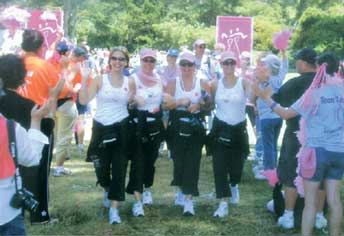Awareness saves local woman from breast cancer
When Angela Ketcham prepared participate in the Avon Breast Cancer Walk last July, she had no idea that if she participated again next year, she would wear the dark pink hat of a cancer survivor.
While she had found a painful lump in her left breast before the walk, Ketcham didn’t know it was cancer until after the event designed to raise funds and awareness of the leading cause of older women had ended. She had been told a common misconception – that painful lumps usually weren’t cancerous. A mammogram the day after the walk confirmed her worst fears: The lump was indeed malignant cancer.
Ketcham discovered the lump during a self-exam. Doctors and the American Cancer Society encourage women to examine their breasts for lumps once a month. October is National Breast Cancer Awareness month and Oct. 21 has been designated as National Mammogram Day.
“With what we were preparing for, talking about, talking to other people about, maybe I was a little more vigilant in checking,” Ketcham said. “But I guess I didn’t really expect to find anything, especially at my age.”
Ketcham, 33, planned to do the Avon walk with her two sisters and her mother, Susan Hansen, a first grade teacher at El Toro Elementary.
As they arrived at the event last July, they were told the significance of the 80 pink ribbons randomly passed out to participants during the weekend. The ribbons symbolized that every six seconds a woman is diagnosed with breast cancer.
Ironically, Ketcham was one of the participants who received a pink ribbon during the event.
“All the cheerleading people on the sides, spouses and friends, everyone was just yelling and clapping, it was amazing,” she said, with a hint of sadness in her voice. “Then, out of nowhere this woman comes and hands me a pink ribbon. I already did know I had a mammogram appointment at this point, but it was just a shock. I said, ‘I don’t want this.’ It was like at that moment, I knew what I was up against. It was overwhelming. At the same time, it was like a sign from God.”
Ketcham said she can still picture the face of the woman who gave her the ribbon, even though she saw her for only a few seconds. She wore her ribbon throughout the walk and focused on what she was doing and on enjoying the time with her mother and her sisters.
“When we crossed the finish line, we thought it was the end of our journey, but really, it was just beginning,” Hansen said.
Sure enough, Ketcham had breast cancer. Because of her persistence, she had a diagnostic mammogram instead of a screening mammogram. When she was told “cancer doesn’t hurt” and that what she had probably wasn’t cancer, she pushed her doctor to schedule the diagnostic anyway. At 33 years old, Ketcham would not have been scheduled for a routine mammogram because the recommended age for regular mammograms is 40.
Her persistence and, she said, her faith in God, led her down the right path.
“It was as if God was carrying me the whole way, like that poem, ‘Footprints,’” she said. “I even asked my doctor, ‘Why am I not having trouble with this decision?’”
The decision Ketcham had to make, she made quickly. She had several options for treatment, but chose a complete mastectomy.
“She told me, ‘I would give my left arm for my kids, why not my left breast,’” Hansen said. “They did reconstructive surgery the same day. And as it turns out, it was a good thing they did the mastectomy.”
During mastectomy, doctors discovered another more serious tumor in her other breast and removed it as well.
“No matter what decision someone makes about their treatment, it is important for them to be persistent, to ask questions, to know what is right for them,” Ketcham said. “As a wife and mother, there was no question for me. It is important to me to be there for my family, and I would do whatever it takes to make that happen.”
Ketcham and her husband, Patrick, have two boys, Riley, 4, and Logan, 2.
Though her journey has been devastatingly difficult, Ketcham feels compelled to educate other women about the silent killer of cancer.
“I really want to help people understand how important early detection is,” she said. “They told me, ‘We got this just at the right time,’” she said. “They said the cancer was more aggressive than they originally thought. If I had waited any longer, they said, it would have been a whole different picture.”
Marilyn Dubil covers education and law enforcement for The Times. Reach her at (408) 779-4106 Ext. 202 or at md****@*************es.com.
Breast Cancer Facts
• This year in America, more than 211,000 women will be
diagnosed with breast cancer and 43,300 will die
• One woman in seven either has or will develop breast
cancer in her lifetime.
• 1,600 men will be diagnosed with breast cancer and 400
will die this year.
• If detected early, the five-year cancer survival rate
exceeds 95 percent.
• Seventy percent of all breast cancers are found through
breast self-exams.
• Not all lumps are detectable by touch.
• October is National Breast Cancer Awareness Month.
• Eight out of ten breast lumps are not cancerous. If you find a lump, don’t panic
– call your doctor for an appointment.
For more information, visit www.nationalbreastcancer.org for the National Breast Cancer Foundation.








